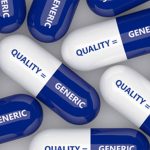 An identical copy of a brand-name drug. A drug company that develops a drug can patent it and sell it exclusively for 17 years (This may be extended by five years in some cases); after that, any company can make and sell a chemically equivalent generic copy of that drug. Generics usually cost considerably less than brand-name drugs.
An identical copy of a brand-name drug. A drug company that develops a drug can patent it and sell it exclusively for 17 years (This may be extended by five years in some cases); after that, any company can make and sell a chemically equivalent generic copy of that drug. Generics usually cost considerably less than brand-name drugs.
Every drug has a generic name, usually a condensed version of the original chemical name, which is suggested and filed for by the pharmaceutical company that invented the drug. The manufacturer also registers the drug under the company’s own promotional name, and that name is the brand name. For example, acetaminophen is the generic name for the brand-name remedies Tylenol, Anacin-3, and Panadol. A generic drug, which does not have to be the same size, shape, or color of the brand-name product, duplicates the active ingredients of the brand-name drug.
A drug that is not protected by a patent. Its name is usually descriptive of its chemical composition, and the drug is typically less expensive than its brand-name counterpart but is equally effective in causing the desired response.
A drug that is not protected by a trademark; the scientific name for a drug as opposed to its proprietary or brand name. Generic drugs contain identical active ingredients and amounts as the brand-name equivalents, but they are usually less expensive.
A medicinal drug that is sold under its official (generic) name instead of its proprietary (patented brand) name. NHS doctors are advised to prescribe generic drugs where possible as this enables any suitable drug to be dispensed, saving delay to the patient and sometimes expense to the NHS.
Nonproprietary drugs (i.e., drugs not protected by a commercial trademark). In the U.S., generic drugs are required to meet strict bioequivalency standards. Manufacturers of brand name drugs produce the majority of generic drugs and allow them to be sold without the original brand name. Both generic and brand name drugs may experience manufacturing defects. Nearly half of all proprietary drugs available in the U.S. are also sold less expensively as generic drugs.
A generic drug refers to a medication that is marketed under its official medical name (its generic name), instead of a patented name (its brand name). Nowadays, most drugs are prescribed using their generic names.
